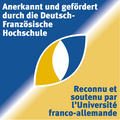Speakers |
Programme |
gallery |
Summer school on Multiscale Modeling and Applications
Sponsored by the Université Franco-Allemande (UFA)
|
Purposes of the Summer school on Multiscale Modeling and Applications
![]() SCIENTIFIC GOALS - This thematic summer school aims at bringing together experts from multiscale modeling and PhD students from Applied Mathematics or Physics with a three-fold objective:
SCIENTIFIC GOALS - This thematic summer school aims at bringing together experts from multiscale modeling and PhD students from Applied Mathematics or Physics with a three-fold objective:
- First, the experts deliver compact lecture courses on state-of-the-art multiscale modeling arising in various applications, ranging from plasma physics and phase separation to biology and supply chains. The chosen speakers are not only the best researchers of their field but also excellent lecturers.
- Second, the PhD students have the opportunity to present their research results in short talks, in the presence of experts from their research fields. An individual feedback will help the PhD students to improve the quality of the presentation.
- Third, based on the short presentations of the PhD students, the world-wide known experts are available for the PhD students for scientific discussions and advices. Such one-to-one discussions are of paramount importance in Mathematics.
Programme
Participants are expected to arrive in Cargese on Monday August 7 and depart on Saturday August 12.
The courses will begin on Tuesday August 8 and the afternoon of Thursday August 10 is free.
The schedule is the following (click on the  to download an archive of the talk).
to download an archive of the talk).
|
|
Tuesday Aug. 8 |
Wednesday Aug. 9 |
Thursday Aug. 10 |
Friday Aug. 11 |
|
8:45-9:00 |
Welcome & Introduction |
9:00-9:50 |
||
|
9:50-10:40 |
||||
|
10:40-11:10 |
Coffee break |
Coffee break |
Coffee break |
Coffee break |
|
11:10-11:40 |
Poster |
S. Lacharme |
||
|
11:40-12:10 |
Poster |
|||
|
12:10-14:00 |
Lunch |
Lunch |
Lunch |
Lunch |
|
14:00-14:50 |
Excursion |
|||
|
14:50-15:40 |
|
|||
|
15:40-16:00 |
Coffee break |
Coffee break |
|
Coffee break |
|
16:00-16:30 |
Y. Ueda |
Excursion |
||
|
Cocktail (19:00) |
Diner (20:00) |
Download an archive of all avialable talks
email us or for more information : follow this link

